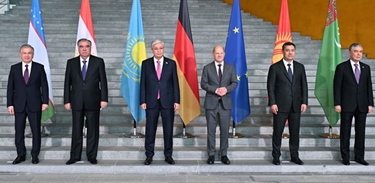Tariq Saeedi
Chancellor Olaf Scholz of Germany will visit Uzbekistan and Kazakhstan, 15-17 September 2024. This would be his first visit to the region.
On 17 September 2024, the last day of his visit, Chancellor Scholz will participate in the C5+1 meeting in Kazakhstan.
The trip comes a year after Scholz hosted the leaders of five Central Asian nations in Berlin to discuss closer cooperation.
On this occasion, it is important to highlight some aspects of the very special relationship between Central Asia and Germany.
In Central Asia, the image of Germans is associated with punctuality, hard work, resourcefulness and trustworthiness.
The German products are believed to be of higher quality and longer lasting.
There are two main reasons for this: 1. The German diaspora that arrived in the region during various periods for different reasons; and 2. The consistent import of high quality products from GDR (East Germany) during the period of the Soviet Union.
Currently there are about 224000 people of German origin in Kazakhstan. In Uzbekistan, this number is about 8000, in Kyrgyzstan also about 8000, and in Tajikistan about 1500. These numbers are an approximation. In Turkmenistan too there is a sizeable pocket of the people of the German origin.
Of the 19 countries of the Western Europe, Germany has the largest diaspora in Central Asia.
Almost every household in Central Asia has something produced in East Germany and imported during the Soviet period. This is one of the positive legacies of those times.
Since the independence of the Central Asian states, Germany (unified Germany) has interacted proactively with the region. It has been the kind of partnership with no strings attached.
The GIZ (Deutsche Gesellschaft für Internationale Zusammenarbeit GmbH), Germany’s leading provider of international cooperation services, is present in every country of Central Asia.
The wide-ranging engagement of GIZ with Central Asia includes trade facilitation, education, drug action programme (CADAP), rule of law, transboundary waters, sustainable and climate friendly land use, climate change, biodiversity, ecosystems, deserts, etc.
The distinguishing feature of GIZ is that it works rather quietly, providing solid support but letting the local partners set the direction and pace. The key here is in the very name of GIZ – Zusammenarbeit i.e. cooperation.
A large part of the work of GIZ is training of the professionals. The focus is on preparing the local specialists. This is helpful in reducing the dependence on the foreign experts.
The roots of this approach are in the very structure of the German educational system – inculcation of the sense of responsibility, pursuit of excellence, and respect for genuine diversity.
Moreover, Germany provides top quality education and it is free.
The business communities in Central Asia interact on their own and through the public sector platforms to acquire knowledge, machinery and expertise from Germany. A fair number of small and medium enterprises look toward Germany for technical and production solutions. In addition to the quality, they also get reliable after-sales service and the necessary training for running and maintaining the machinery.
Germany has set examples in a number of areas that have earned it great respect in Central Asia. For instance, Germany has fulfilled every commitment it made after the World War II.
The great lengths to which Germany went during the tough and challenging period of unification is admired by this region.
The healthcare sector is a vital area where Central Asia trusts Germany.
Above all, there is a human element. It is somehow easy to build friendship with a German.
* * *
The conversation about the special relationship between Central Asia and Germany cannot be complete without the mention of Dr. Hanno Schaumberg. During the last years of his life, he was Professor Emeritus at the Hamburg University of Technology. — He was my friend.
We had the honour to publish some of his works:
Present State and Future of Hydrogen Energy (1 June 2022)
https://www.newscentralasia.net/2022/06/01/present-state-and-future-of-hydrogen-energy/
Green Hydrogen Energy (14 April 2021)
https://www.newscentralasia.net/2021/04/14/green-hydrogen-energy-2/
Green Hydrogen Energy (31 March 2021)
https://www.newscentralasia.net/2021/03/31/green-hydrogen-energy/
Strategy for a Large Scale Introduction of Solar Energy in Turkmenistan (8 September 2017)
https://www.newscentralasia.net/2017/09/08/strategy-for-a-large-scale-introduction-of-solar-energy-in-turkmenistan/
Turkmenistan: Case for using intellectual property to increase GDP (30 July 2012)
https://www.newscentralasia.net/2012/07/30/turkmenistan-case-for-using-intellectual-property-to-increase-gdp/
Progress in Science and Industry – a Task for International Cooperation (21 February 2012)
https://www.newscentralasia.net/2012/02/21/progress-in-science-and-industry-a-task-for-international-cooperation/
Whatever he did, he did with great passion and sharp focus, be it promoting the hydrogen energy or growing spices and herbs in his garden.
He was instrumental in developing the first version of the Turkmen alphabet suitable for the Internet.
He brought a 5MW solar power plant to the polytechnic institute of Ashgabat.
He contributed to the academic interaction between Turkmenistan and Germany.
Active until the last, he pushed for the exploration of the hydrogen energy and attracted the interest of Turkmenistan to this emerging area. He was truly ahead of his time.
With people like Hanno, it is easy to understand as to why Central Asia feels a special affinity with Germany. /// nCa, 13 September 2024
